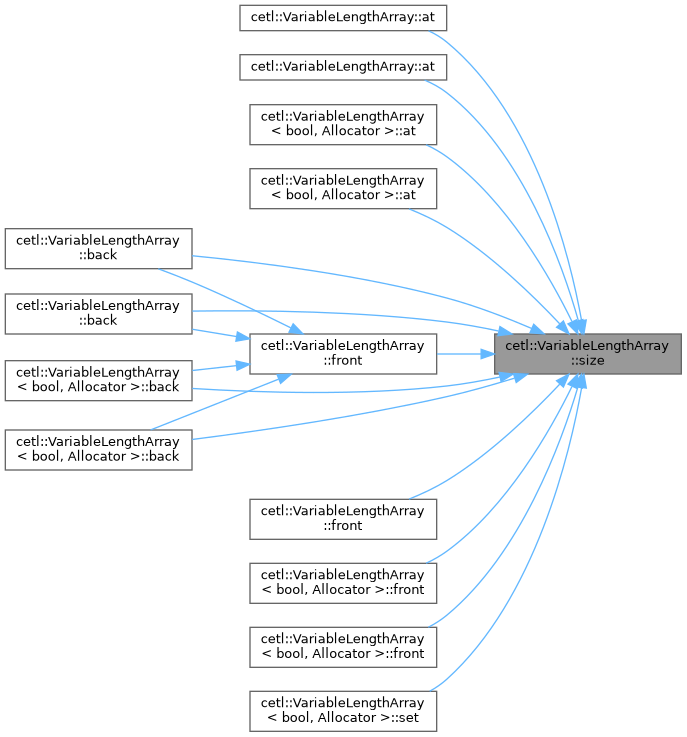#include "cetl/variable_length_array.hpp"
Public Types | |
| using | value_type = typename Base::value_type |
| using | pointer = typename std::add_pointer_t<value_type> |
| using | iterator = typename std::add_pointer_t<value_type> |
| using | const_iterator = typename std::add_pointer_t<typename std::add_const_t<value_type>> |
| using | difference_type = typename Base::difference_type |
| using | size_type = typename Base::size_type |
| using | allocator_type = typename Base::allocator_type |
| using | reference = typename std::add_lvalue_reference_t<value_type> |
| using | const_reference = typename std::add_lvalue_reference_t<std::add_const_t<value_type>> |
Public Member Functions | |
| VariableLengthArray (const allocator_type &alloc) noexcept | |
| VariableLengthArray (size_type max_size_max, const allocator_type &alloc) noexcept | |
| VariableLengthArray (std::initializer_list< value_type > l, size_type max_size_max, const allocator_type &alloc) | |
| VariableLengthArray (std::initializer_list< value_type > l, const allocator_type &alloc) | |
| template<class InputIt> | |
| VariableLengthArray (InputIt first, InputIt last, size_type max_size_max, const allocator_type &alloc) | |
| template<class InputIt> | |
| VariableLengthArray (InputIt first, InputIt last, const allocator_type &alloc) | |
| VariableLengthArray (const VariableLengthArray &rhs, const allocator_type &alloc) | |
| VariableLengthArray (const VariableLengthArray &rhs) | |
| VariableLengthArray & | operator= (const VariableLengthArray &rhs) |
| VariableLengthArray (VariableLengthArray &&rhs, const allocator_type &alloc) noexcept | |
| VariableLengthArray (VariableLengthArray &&rhs) noexcept | |
| VariableLengthArray & | operator= (VariableLengthArray &&rhs) noexcept(std::allocator_traits< allocator_type >::propagate_on_container_move_assignment::value||std::allocator_traits< allocator_type >::is_always_equal::value) |
| constexpr bool | operator== (const VariableLengthArray &rhs) const noexcept |
| constexpr bool | operator!= (const VariableLengthArray &rhs) const noexcept |
| constexpr const_iterator | cbegin () const noexcept |
| constexpr const_iterator | cend () const noexcept |
| constexpr iterator | begin () noexcept |
| constexpr const_iterator | begin () const noexcept |
| constexpr iterator | end () noexcept |
| constexpr const_iterator | end () const noexcept |
| constexpr value_type * | data () noexcept |
| constexpr const value_type * | data () const noexcept |
| constexpr const value_type & | operator[] (size_type pos) const noexcept |
| constexpr value_type & | operator[] (size_type pos) noexcept |
| constexpr allocator_type | get_allocator () const noexcept |
| constexpr reference | at (size_type pos) |
| constexpr const_reference | at (size_type pos) const |
| constexpr reference | front () |
| constexpr const_reference | front () const |
| constexpr reference | back () |
| constexpr const_reference | back () const |
| constexpr bool | empty () const noexcept |
| void | shrink_to_fit () |
| constexpr size_type | capacity () const noexcept |
| constexpr size_type | size () const noexcept |
| void | reserve (const size_type desired_capacity) |
| constexpr size_type | max_size () const noexcept |
| constexpr void | clear () noexcept(std::is_nothrow_destructible< value_type >::value) |
| constexpr void | push_back (const value_type &value) |
| constexpr void | push_back (value_type &&value) |
| constexpr void | pop_back () noexcept(std::is_nothrow_destructible< value_type >::value) |
| template<class... Args> | |
| void | emplace_back (Args &&... args) |
| constexpr void | resize (size_type count) |
| constexpr void | resize (size_type count, const value_type &value) |
| constexpr void | assign (size_type count, const value_type &value) |
Protected Types | |
| using | Base = VariableLengthArrayBase<T, Allocator> |
 Protected Types inherited from cetl::VariableLengthArrayBase< T, Allocator > Protected Types inherited from cetl::VariableLengthArrayBase< T, Allocator > | |
| using | reallocate_operation |
| using | value_type |
| using | allocator_type |
| using | difference_type |
| using | size_type |
Protected Attributes | |
| value_type * | data_ |
| size_type | size_ |
| size_type | capacity_ |
| size_type | max_size_max_ |
| allocator_type | alloc_ |
 Protected Attributes inherited from cetl::VariableLengthArrayBase< T, Allocator > Protected Attributes inherited from cetl::VariableLengthArrayBase< T, Allocator > | |
| allocator_type | alloc_ |
| value_type * | data_ |
| size_type | capacity_ |
| size_type | size_ |
| size_type | max_size_max_ |
| allocator_type | alloc_ |
| value_type * | data_ |
| size_type | capacity_ |
| size_type | size_ |
| size_type | max_size_max_ |
Additional Inherited Members | |
 Protected Member Functions inherited from cetl::VariableLengthArrayBase< T, Allocator > Protected Member Functions inherited from cetl::VariableLengthArrayBase< T, Allocator > | |
| constexpr bool | move_assign_alloc (UAlloc &&rhs, typename std::enable_if_t< std::allocator_traits< std::remove_reference_t< UAlloc > >::propagate_on_container_move_assignment::value > *=nullptr) noexcept(is_pocma_or_is_always_equal< UAlloc >::value) |
| constexpr bool | move_assign_alloc (UAlloc &&rhs, typename std::enable_if_t< !std::allocator_traits< std::remove_reference_t< UAlloc > >::propagate_on_container_move_assignment::value > *=nullptr) noexcept(is_pocma_or_is_always_equal< UAlloc >::value) |
| constexpr bool | copy_assign_alloc (const UAlloc &rhs, typename std::enable_if_t< std::allocator_traits< UAlloc >::propagate_on_container_copy_assignment::value > *=nullptr) noexcept |
| constexpr bool | copy_assign_alloc (const UAlloc &rhs, typename std::enable_if_t<!std::allocator_traits< UAlloc >::propagate_on_container_copy_assignment::value > *=nullptr) noexcept |
| constexpr void | copy_assign_from (const VariableLengthArrayBase &rhs, const size_type rhs_max_size) |
| constexpr void | move_assign_from (VariableLengthArrayBase &&rhs, const size_type rhs_max_size, typename std::enable_if_t< is_pocma_or_is_always_equal< UAlloc >::value > *=nullptr) noexcept |
| constexpr void | move_assign_from (VariableLengthArrayBase &&rhs, const size_type rhs_max_size, typename std::enable_if_t<!is_pocma_or_is_always_equal< UAlloc >::value > *=nullptr) |
| constexpr void | reserve (const size_type desired_capacity, const size_type max_size) |
| constexpr void | resize (size_type new_size, const size_type max_size, Args &&... args) |
| constexpr void | shrink_to_fit () |
| constexpr bool | grow (const size_type max_size) |
| constexpr | VariableLengthArrayBase (const allocator_type &alloc, value_type *data, size_type initial_capacity, size_type size, size_type max_size_max) noexcept(std::is_nothrow_copy_constructible< allocator_type >::value) |
| constexpr | VariableLengthArrayBase (const VariableLengthArrayBase &rhs, const allocator_type &rhs_alloc) noexcept(std::is_nothrow_copy_constructible< allocator_type >::value) |
| constexpr | VariableLengthArrayBase (VariableLengthArrayBase &&rhs) noexcept |
| constexpr | VariableLengthArrayBase (VariableLengthArrayBase &&rhs, const UAlloc &rhs_alloc, typename std::enable_if_t< is_pocma_or_is_always_equal< UAlloc >::value > *=nullptr) noexcept |
| constexpr | VariableLengthArrayBase (VariableLengthArrayBase &&rhs, const UAlloc &rhs_alloc, typename std::enable_if_t<!is_pocma_or_is_always_equal< UAlloc >::value > *=nullptr) noexcept |
| constexpr bool | move_assign_alloc (UAlloc &&rhs, typename std::enable_if_t< std::allocator_traits< std::remove_reference_t< UAlloc > >::propagate_on_container_move_assignment::value > *=nullptr) noexcept(is_pocma_or_is_always_equal< UAlloc >::value) |
| constexpr bool | move_assign_alloc (UAlloc &&rhs, typename std::enable_if_t< !std::allocator_traits< std::remove_reference_t< UAlloc > >::propagate_on_container_move_assignment::value > *=nullptr) noexcept(is_pocma_or_is_always_equal< UAlloc >::value) |
| constexpr bool | copy_assign_alloc (const UAlloc &rhs, typename std::enable_if_t< std::allocator_traits< UAlloc >::propagate_on_container_copy_assignment::value > *=nullptr) noexcept |
| constexpr bool | copy_assign_alloc (const UAlloc &rhs, typename std::enable_if_t<!std::allocator_traits< UAlloc >::propagate_on_container_copy_assignment::value > *=nullptr) noexcept |
| constexpr void | copy_assign_from (const VariableLengthArrayBase &rhs, const size_type rhs_max_size) |
| constexpr void | move_assign_from (VariableLengthArrayBase &&rhs, const size_type rhs_max_size, typename std::enable_if_t< is_pocma_or_is_always_equal< UAlloc >::value > *=nullptr) noexcept |
| constexpr void | move_assign_from (VariableLengthArrayBase &&rhs, const size_type rhs_max_size, typename std::enable_if_t<!is_pocma_or_is_always_equal< UAlloc >::value > *=nullptr) |
| constexpr void | reserve (const size_type desired_capacity, const size_type max_size) |
| constexpr void | resize (size_type new_size, const size_type max_size, Args &&... args) |
| constexpr void | shrink_to_fit () |
| constexpr bool | grow (const size_type max_size) |
| constexpr | VariableLengthArrayBase (const allocator_type &alloc, value_type *data, size_type initial_capacity, size_type size, size_type max_size_max) noexcept(std::is_nothrow_copy_constructible< allocator_type >::value) |
| constexpr | VariableLengthArrayBase (const VariableLengthArrayBase &rhs, const allocator_type &rhs_alloc) noexcept(std::is_nothrow_copy_constructible< allocator_type >::value) |
| constexpr | VariableLengthArrayBase (VariableLengthArrayBase &&rhs) noexcept |
| constexpr | VariableLengthArrayBase (VariableLengthArrayBase &&rhs, const UAlloc &rhs_alloc, typename std::enable_if_t< is_pocma_or_is_always_equal< UAlloc >::value > *=nullptr) noexcept |
| constexpr | VariableLengthArrayBase (VariableLengthArrayBase &&rhs, const UAlloc &rhs_alloc, typename std::enable_if_t<!is_pocma_or_is_always_equal< UAlloc >::value > *=nullptr) noexcept |
 Static Protected Member Functions inherited from cetl::VariableLengthArrayBase< T, Allocator > Static Protected Member Functions inherited from cetl::VariableLengthArrayBase< T, Allocator > | |
| static constexpr std::enable_if_t< is_detected< reallocate_operation, UAllocator >::value, value_type > * | reallocate (value_type *data, UAllocator &alloc, std::size_t old_object_count, std::size_t new_object_count) |
| static constexpr std::enable_if_t<!is_detected< reallocate_operation, UAllocator >::value, value_type > * | reallocate (value_type *data, UAllocator &alloc, std::size_t old_object_count, std::size_t new_object_count) |
| static constexpr void | fast_destroy (U *const src, const size_type src_size_count, typename std::enable_if_t< std::is_trivially_destructible< U >::value > *=nullptr) noexcept |
| static constexpr void | fast_destroy (U *const src, const size_type src_size_count, typename std::enable_if_t<!std::is_trivially_destructible< U >::value > *=nullptr) noexcept(std::is_nothrow_destructible< U >::value) |
| static constexpr void | fast_deallocate (U *const src, const size_type src_size_count, const size_type src_capacity_count, allocator_type &alloc, typename std::enable_if_t< std::is_trivially_destructible< U >::value > *=nullptr) |
| static constexpr void | fast_deallocate (U *const src, const size_type src_size_count, const size_type src_capacity_count, allocator_type &alloc, typename std::enable_if_t<!std::is_trivially_destructible< U >::value > *=nullptr) |
| static constexpr size_type | fast_copy_assign (value_type *dst, size_type dst_capacity_count, InputIt src) noexcept(noexcept(std::is_nothrow_assignable< value_type, std::remove_pointer_t< InputIt > >::value)) |
| static constexpr size_type | fast_copy_assign (value_type *dst, size_type dst_capacity_count, InputIt src, size_type src_len_count) noexcept(noexcept(std::is_nothrow_assignable< value_type, std::remove_pointer_t< InputIt > >::value)) |
| static constexpr size_type | fast_copy_construct (value_type *const dst, size_type dst_capacity_count, const InputIt src, size_type src_len_count, allocator_type &alloc, typename std::enable_if_t< is_array_of_type_trivially_copyable< std::add_pointer_t< value_type >, InputIt >::value > *=nullptr) noexcept |
| static constexpr size_type | fast_copy_construct (value_type *const dst, size_type dst_capacity_count, const InputIt src, size_type src_len_count, allocator_type &alloc, typename std::enable_if_t< !is_array_of_type_trivially_copyable< std::add_pointer_t< value_type >, InputIt >::value > *=nullptr) noexcept(noexcept(std::allocator_traits< allocator_type >::construct(std::declval< std::add_lvalue_reference_t< allocator_type > >(), std::declval< std::add_pointer_t< value_type > >(), std::declval< std::add_lvalue_reference_t< decltype(std::declval< const InputIt >()[0])> >()))) |
| static constexpr size_type | fast_forward_construct (value_type *const dst, size_type dst_capacity_count, InputIt src, size_type src_len_count, allocator_type &alloc, typename std::enable_if_t< is_array_of_type_trivially_copyable< std::add_pointer_t< value_type >, InputIt >::value > *=nullptr) |
| static constexpr size_type | fast_forward_construct (value_type *const dst, size_type dst_capacity_count, InputIt src, size_type src_len_count, allocator_type &alloc, typename std::enable_if_t< !is_array_of_type_trivially_copyable< std::add_pointer_t< value_type >, InputIt >::value > *=nullptr) |
| static constexpr size_type | fast_forward_assign (value_type *const dst, size_type dst_capacity_count, InputIt src, size_type src_len_count, typename std::enable_if_t< is_array_of_type_trivially_copyable< std::add_pointer_t< value_type >, InputIt >::value > *=nullptr) |
| static constexpr size_type | fast_forward_assign (value_type *const dst, size_type dst_capacity_count, InputIt src, size_type src_len_count, typename std::enable_if_t< !is_array_of_type_trivially_copyable< std::add_pointer_t< value_type >, InputIt >::value > *=nullptr) |
| static constexpr std::enable_if_t< is_detected< reallocate_operation, UAllocator >::value, value_type > * | reallocate (value_type *data, UAllocator &alloc, std::size_t old_object_count, std::size_t new_object_count) |
| static constexpr std::enable_if_t<!is_detected< reallocate_operation, UAllocator >::value, value_type > * | reallocate (value_type *data, UAllocator &alloc, std::size_t old_object_count, std::size_t new_object_count) |
| static constexpr void | fast_destroy (U *const src, const size_type src_size_count, typename std::enable_if_t< std::is_trivially_destructible< U >::value > *=nullptr) noexcept |
| static constexpr void | fast_destroy (U *const src, const size_type src_size_count, typename std::enable_if_t<!std::is_trivially_destructible< U >::value > *=nullptr) noexcept(std::is_nothrow_destructible< U >::value) |
| static constexpr void | fast_deallocate (U *const src, const size_type src_size_count, const size_type src_capacity_count, allocator_type &alloc, typename std::enable_if_t< std::is_trivially_destructible< U >::value > *=nullptr) |
| static constexpr void | fast_deallocate (U *const src, const size_type src_size_count, const size_type src_capacity_count, allocator_type &alloc, typename std::enable_if_t<!std::is_trivially_destructible< U >::value > *=nullptr) |
| static constexpr size_type | fast_copy_assign (value_type *dst, size_type dst_capacity_count, InputIt src) noexcept(noexcept(std::is_nothrow_assignable< value_type, std::remove_pointer_t< InputIt > >::value)) |
| static constexpr size_type | fast_copy_assign (value_type *dst, size_type dst_capacity_count, InputIt src, size_type src_len_count) noexcept(noexcept(std::is_nothrow_assignable< value_type, std::remove_pointer_t< InputIt > >::value)) |
| static constexpr size_type | fast_copy_construct (value_type *const dst, size_type dst_capacity_count, const InputIt src, size_type src_len_count, allocator_type &alloc, typename std::enable_if_t< is_array_of_type_trivially_copyable< std::add_pointer_t< value_type >, InputIt >::value > *=nullptr) noexcept |
| static constexpr size_type | fast_copy_construct (value_type *const dst, size_type dst_capacity_count, const InputIt src, size_type src_len_count, allocator_type &alloc, typename std::enable_if_t< !is_array_of_type_trivially_copyable< std::add_pointer_t< value_type >, InputIt >::value > *=nullptr) noexcept(noexcept(std::allocator_traits< allocator_type >::construct(std::declval< std::add_lvalue_reference_t< allocator_type > >(), std::declval< std::add_pointer_t< value_type > >(), std::declval< std::add_lvalue_reference_t< decltype(std::declval< const InputIt >()[0])> >()))) |
| static constexpr size_type | fast_forward_construct (value_type *const dst, size_type dst_capacity_count, InputIt src, size_type src_len_count, allocator_type &alloc, typename std::enable_if_t< is_array_of_type_trivially_copyable< std::add_pointer_t< value_type >, InputIt >::value > *=nullptr) |
| static constexpr size_type | fast_forward_construct (value_type *const dst, size_type dst_capacity_count, InputIt src, size_type src_len_count, allocator_type &alloc, typename std::enable_if_t< !is_array_of_type_trivially_copyable< std::add_pointer_t< value_type >, InputIt >::value > *=nullptr) |
| static constexpr size_type | fast_forward_assign (value_type *const dst, size_type dst_capacity_count, InputIt src, size_type src_len_count, typename std::enable_if_t< is_array_of_type_trivially_copyable< std::add_pointer_t< value_type >, InputIt >::value > *=nullptr) |
| static constexpr size_type | fast_forward_assign (value_type *const dst, size_type dst_capacity_count, InputIt src, size_type src_len_count, typename std::enable_if_t< !is_array_of_type_trivially_copyable< std::add_pointer_t< value_type >, InputIt >::value > *=nullptr) |
Minimal, generic container for storing Cyphal variable-length arrays.
While this type shares similarities with std::vector it has several important properties that are different. First, the max_size_max maximum bound allows the array to enforce a maximum size whether or not the allocator properly implements the std::allocator_traits::max_size protocol (std::pmr::polymorphic_allocator, for example). This allows use of an allocator that is backed by statically allocated memory:
Even if cetl::VariableLengthArray::reserve() is not used the implementation will still use less memory then its STL counterpart:
Finally, when exceptions are disabled the cetl::VariableLengthArray will not exhibit undefined behaviour like std::vector does:
| T | The type of elements in the array. |
| Allocator | The allocator type to use for all allocations. |
| using cetl::VariableLengthArray< T, Allocator >::allocator_type = typename Base::allocator_type |
Per the std::uses_allocator protocol.
| using cetl::VariableLengthArray< T, Allocator >::const_iterator = typename std::add_pointer_t<typename std::add_const_t<value_type>> |
STL-like declaration of the const iterator type.
| using cetl::VariableLengthArray< T, Allocator >::const_reference = typename std::add_lvalue_reference_t<std::add_const_t<value_type>> |
STL-like declaration of constant-reference type.
| using cetl::VariableLengthArray< T, Allocator >::difference_type = typename Base::difference_type |
STL-like declaration of the container's difference type.
| using cetl::VariableLengthArray< T, Allocator >::iterator = typename std::add_pointer_t<value_type> |
STL-like declaration of the iterator type.
| using cetl::VariableLengthArray< T, Allocator >::pointer = typename std::add_pointer_t<value_type> |
STL-like declaration of pointer type.
| using cetl::VariableLengthArray< T, Allocator >::reference = typename std::add_lvalue_reference_t<value_type> |
STL-like declaration of reference type.
| using cetl::VariableLengthArray< T, Allocator >::size_type = typename Base::size_type |
STL-like declaration of the container's size type.
| using cetl::VariableLengthArray< T, Allocator >::value_type = typename Base::value_type |
STL-like declaration of the container's storage type.
|
inlineexplicitnoexcept |
Required constructor for std::uses_allocator protocol.
| alloc | Allocator to use for all allocations. |
References std::numeric_limits::max().
Referenced by VariableLengthArray(), and VariableLengthArray().

|
inlineexplicitnoexcept |
Required constructor for std::uses_allocator protocol.
| max_size_max | Clamping value for the maximum size of this array. That is, cetl::VariableLengthArray::max_size() will return std::min(max_size_max, std::allocator_traits<allocator_type>::max_size(alloc)) |
| alloc | Allocator to use for all allocations. |
|
inline |
Initializer syntax constructor with maximum max size.
| l | Initializer list of elements to copy into the array. |
| max_size_max | Clamping value for the maximum size of this array. That is, cetl::VariableLengthArray::max_size() will return std::min(max_size_max, std::allocator_traits<allocator_type>::max_size(alloc)) |
| alloc | Allocator to use for all allocations. |
References std::initializer_list::begin(), cetl::VariableLengthArrayBase< T, Allocator >::fast_copy_construct(), reserve(), and std::initializer_list::size().
|
inline |
Initializer syntax constructor.
| l | Initializer list of elements to copy into the array. |
| alloc | Allocator to use for all allocations. |
References VariableLengthArray().
|
inline |
Range constructor with maximum max size.
| InputIt | The type of the range's iterators. |
| first | The beginning of the range. |
| last | The end of the range. |
| max_size_max | Clamping value for the maximum size of this array. That is, cetl::VariableLengthArray::max_size() will return std::min(max_size_max, / std::allocator_traits<allocator_type>::max_size(alloc)) |
| alloc | Allocator to use for all allocations. |
References cetl::VariableLengthArrayBase< T, Allocator >::fast_copy_construct(), and reserve().
|
inline |
Range constructor.
| InputIt | The type of the range's iterators. |
| first | The beginning of the range. |
| last | The end of the range. |
| alloc | Allocator to use for all allocations. |
References VariableLengthArray().
|
inlineconstexpr |
Set count elements to the given value.
Grow the array if needed else set the size to count without reducing capacity.
| count | Number of elements, starting from 0, to set. |
| value | The value to set. |
| std::length_error | if the size requested is greater than max_size(). |
| std::bad_alloc | if the container cannot obtain enough memory to size up to count. |
References cetl::VariableLengthArrayBase< T, Allocator >::fast_copy_assign(), and resize().
|
inlineconstexpr |
Returns a reference to the element at specified location pos, with bounds checking.
| pos | Position of the element to return. |
References operator[](), and size().
|
inlineconstexpr |
Returns a const reference to the element at specified location pos, with bounds checking.
| pos | Position of the element to return. |
References operator[](), and size().
|
inlineconstexpr |
|
inlineconstexpr |
|
inlineconstexprnoexcept |
Provides direct, unsafe access to the internal data buffer.
This pointer is invalidated by calls to shrink_to_fit and reserve.
|
inlineconstexprnoexcept |
The number of elements that can be stored in the array without further allocations.
This number will only grow through calls to reserve and can shrink through calls to shrink_to_fit. This value shall never exceed max_size.
|
inlineconstexprnoexcept |
Provides direct, unsafe access to the internal data buffer.
This pointer is invalidated by calls to shrink_to_fit and reserve.
|
inlineconstexprnoexcept |
Pointer to memory location after the last, valid element.
This pointer is invalidated by calls to shrink_to_fit and reserve.
|
inlineconstexprnoexcept |
Destroys all elements in the list but does not release any capacity.
References cetl::VariableLengthArrayBase< T, Allocator >::fast_destroy().
|
inlineconstexprnoexcept |
Provides direct, unsafe access to the internal data buffer.
This pointer is invalidated by calls to shrink_to_fit and reserve.
|
inlineconstexprnoexcept |
Provides direct, unsafe access to the internal data buffer.
This pointer is invalidated by calls to shrink_to_fit and reserve.
|
inline |
Like push_back but constructs the object directly in uninitialized memory.
| throw | std::length_error if there was not enough storage for an additional element. If exceptions are disabled then the caller must check the array size before and after calling the method to determine if it succeeded. |
References std::allocator_traits::construct(), and std::forward().
Referenced by cetl::VariableLengthArray< bool, Allocator >::VariableLengthArray(), and cetl::VariableLengthArray< bool, Allocator >::VariableLengthArray().

|
inlineconstexprnoexcept |
Query if the container has any elements in it at all.
true if the container is empty, false otherwise.
|
inlineconstexprnoexcept |
Pointer to memory location after the last, valid element.
This pointer is invalidated by calls to shrink_to_fit and reserve.
|
inlineconstexpr |
Returns a reference to the first element in the array.
Calling this method on an empty array is undefined.
References CETL_DEBUG_ASSERT, and size().
Referenced by back(), back(), cetl::VariableLengthArray< bool, Allocator >::back(), and cetl::VariableLengthArray< bool, Allocator >::back().
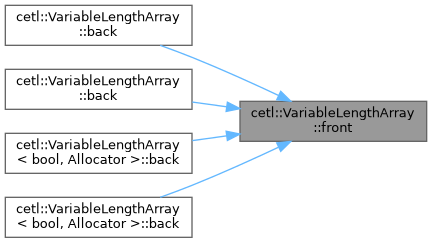
|
inlineconstexpr |
Returns a const reference to the first element in the array.
Calling this method on an empty array is undefined.
References CETL_DEBUG_ASSERT, and size().
|
inlineconstexprnoexcept |
STL-like access to a copy of the internal allocator.
|
inlineconstexprnoexcept |
Returns the, theoretical, maximum number of elements that can be stored in this container.
It does not take into account the current state of the allocator. That is, if the allocator is out of memory this method will still return the maximum number of elements that could be stored if the allocator had enough memory, however, it will always return the maximum size passed into the constructor if that value is less than the allocator's max_size.
References std::numeric_limits::max(), std::allocator_traits::max_size(), and std::min().
Referenced by reserve(), cetl::VariableLengthArray< bool, Allocator >::reserve(), resize(), resize(), cetl::VariableLengthArray< bool, Allocator >::resize(), and cetl::VariableLengthArray< bool, Allocator >::VariableLengthArray().
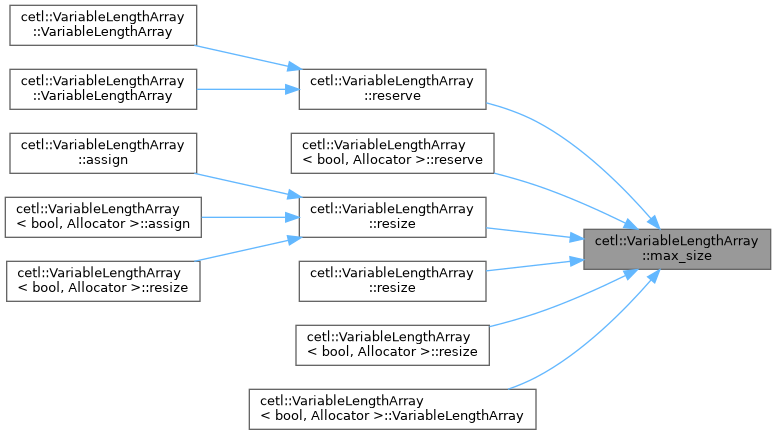
|
inlineconstexprnoexcept |
Direct, const access to an element.
If pos is > size the behavior is undefined.
The returned reference is valid while this object is unless reserve or shrink_to_fit is called.
Referenced by at(), at(), cetl::VariableLengthArray< bool, Allocator >::at(), cetl::VariableLengthArray< bool, Allocator >::at(), cetl::VariableLengthArray< bool, Allocator >::back(), cetl::VariableLengthArray< bool, Allocator >::back(), cetl::VariableLengthArray< bool, Allocator >::front(), and cetl::VariableLengthArray< bool, Allocator >::front().
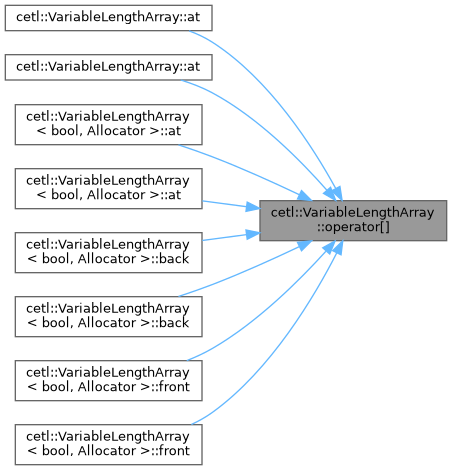
|
inlineconstexprnoexcept |
Direct access to an element.
If pos is > size the behavior is undefined.
The returned reference is valid while this object is unless reserve or shrink_to_fit is called.
| pos | The index of the element to access. |
pos.
|
inlineconstexprnoexcept |
Remove and destroy the last item in the array.
This reduces the array size by 1 unless the array is already empty.
|
inlineconstexpr |
Allocate a new element on to the back of the array and copy value into it.
Grows size by 1 and may grow capacity.
If exceptions are disabled the caller must check before and after to see if the size grew to determine success. If using exceptions this method throws std::length_error if the size of this collection is at capacity or std::bad_alloc if the allocator failed to provide enough memory.
If exceptions are disabled use the following logic:
const size_t size_before = my_array.size();
my_array.push_back(element);
if (size_before == my_array.size())
{
// failure
if (size_before == my_array.max_size())
{
// length_error: you probably should have checked this first.
}
else
{
// bad_alloc: out of memory
}
} // else, success.
|
inlineconstexpr |
Allocate a new element on to the back of the array and move value into it.
Grows size by 1 and may grow capacity.
See VariableLengthArray::push_back(value_type&) for full documentation.
| std::length_error | if the size of this collection is at capacity. |
| std::bad_alloc | if memory was needed and none could be allocated. |
References std::forward().
|
inline |
Ensure enough memory is allocated to store at least the desired_capacity number of elements.
| desired_capacity | The number of elements to allocate, but not initialize, memory for. |
References max_size(), and cetl::VariableLengthArrayBase< T, Allocator >::reserve().
Referenced by VariableLengthArray(), and VariableLengthArray().

|
inlineconstexpr |
Resizes internal storage to count elements default initializing any added elements over the current size() and deleting any elements under the current size().
If size() == count then this method has no effect.
| count | The new size to set for this container. |
| * | If exceptions are enabled then any exceptions that value_type constructors or destructors throw will escape this call |
| std::length_error | if the size requested is greater than max_size(). |
| std::bad_alloc | if the container cannot obtain enough memory to size up to count. |
References max_size().
Referenced by assign(), cetl::VariableLengthArray< bool, Allocator >::assign(), and cetl::VariableLengthArray< bool, Allocator >::resize().
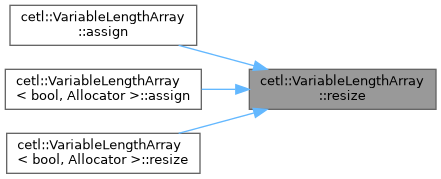
|
inlineconstexpr |
Resizes internal storage to count elements copy-initializing any added elements over the current size() and deleting any elements under the current size().
If size() == count then this method has no effect.
| count | The new size to set for this container. |
| value | The value to copy into any new elements created by the operation. |
| * | If exceptions are enabled then any exceptions that value_type constructors or destructors throw will escape this call |
| std::length_error | if the size requested is greater than max_size(). |
| std::bad_alloc | if the container cannot obtain enough memory to size up to count. |
References max_size().
|
inline |
Reduce the amount of memory held by this object to the minimum required based on size.
This method may not actually deallocate any memory if if there is not enough memory to allocate a smaller buffer before moving the existing elements and freeing the larger buffer.
| if | any items throw while being moved. |
References cetl::VariableLengthArrayBase< T, Allocator >::shrink_to_fit().
|
inlineconstexprnoexcept |
The current number of elements in the array.
This number increases with each successful call to push_back and decreases with each call to pop_back (when size is > 0).
Referenced by at(), at(), cetl::VariableLengthArray< bool, Allocator >::at(), cetl::VariableLengthArray< bool, Allocator >::at(), back(), back(), cetl::VariableLengthArray< bool, Allocator >::back(), cetl::VariableLengthArray< bool, Allocator >::back(), front(), front(), cetl::VariableLengthArray< bool, Allocator >::front(), cetl::VariableLengthArray< bool, Allocator >::front(), and cetl::VariableLengthArray< bool, Allocator >::set().
